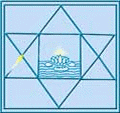|
This All-Delight is present not only in the universal consciousness but also in the individual consciousness in the psychic being. The psychic being "extracts a divine meaning and use from our most poignant sufferings, difficulties, misfortunes". (Ibid, pg.421) It is the All-Delight which actually imposes such harsh experiences and then turns them into our spiritual profit! This is only possible as "an inalienable harmony of being inherent in an inalienable unity of being" (Ibid) could afford to secure harshest discords into a growing universal rhythm.
The law of manifestation
What should be the worth of all we label as evil - "grief, pain, suffering, error, falsehood, ignorance, weakness, wickedness, incapacity, non-doing of what should be done and wrong-doing, deviation of will and denial of will, egoism, limitation, division from other beings with whom we should be one"? (Ibid) For all these are not fictions and we find "a cosmic and individual utility" (Ibid) in our adversities. For example without the value of pain we would be unable to get the infinite value of divine delight. All is imperfection is the first condition of the law of the manifestation -the law of life evolving out of Inconscience. (Ibid, pg.422) But at the same time our revolt against the imperfection is also necessary for "the ultimate command on us is to reject, to overcome, to transform the life and the nature". (Ibid) And we can learn to live inwardly, in the depths, untouched by outer nature but still there is the ordeal and suffering of others of which the soul cannot be regardless. "There is a unity with all beings which something within us feels and the deliverance of others must be felt as intimate to its own deliverance." (Ibid)
The dualities that result from the law of manifestation appear to be creations of the mind but in a deeper reality, they are creations of the Divine Consciousness, "projecting mind away from its all-knowledge so as to realise these opposite or contrary values of its all-power, all-knowledge, all-delight, all-being and unity". (Ibid, pg.423) They do not represent the eternal and fundamental truth of being and in fact contradict the eventual truth of being but nevertheless have some justification to exist.
But these dualities of nature cannot be "fixed in their statutory and stationary law of being". (Ibid) Or else the human urge to rise up from all imperfection would not be any issue; the only issue would be to get out of this human existence into a heaven or in the Nirvana of the featureless Absolute. The soul, by taking on the human nature, seems to have committed an original sin or error which on enlightenment, must be eliminated! (Ibid, pg.424)
Lila, the cosmic game
One reason for the existence of dualities of "a paradoxical manifestation or creation is that it is a cosmic game, a Lila, a play, an amusement of the Divine Being". (Ibid) It can be retorted that an all-Blissful God who imposes such misfortune on his subjects would be no Divinity and must be denied! Or else since the human soul is a portion of the Divine, it is the Divine Spirit in the human being who has consented to bear this suffering. The Lila still then remains paradoxical but it ceases to be a cruel paradox, it can be regarded as a strange mystery. "To explain it there must be two missing elements, a conscious assent by the soul to this manifestation and a reason in the All-Wisdom that makes the play significant and intelligible."(Ibid, pg.425)
The paradox diminishes as we find that a progressive divine manifestation evolves from the Inconscient and rises to the Superconscient with the human consciousness at a decisive point in the transition. Evolution means a "partial unfolding" (Ibid) and this partial unfolding necessitates imperfection at every stage. And added to the imperfection and ignorance is the perversion so that all that is against the divine nature can be upheld and endured. Once initiated, perversion becomes complex as what is wrong by mistake afterwards becomes "wrong by choice, by attachment, by delight in the falsehood." (Ibid, pg.426) Why was this kind of progressive manifestation necessary --- this is the sole riddle left for the intelligence to solve!
A progressive manifestation would not be justifiably imposed on unwilling creatures. The assent of the embodied spirit must have been there as Prakriti needs the assent of the Purusha to act. "There must have been not only the will of the Divine Purusha to make the cosmic creation possible, but the assent of the individual Purusha to make the individual manifestation possible."(Ibid)
"But it may be said that the reason for the Divine Will and delight in such a difficult and tormented progressive manifestation and the reason for the soul's assent to it is still a mystery." (Ibid) However it does not appear to be a mystery if we look at our own nature. For in self-concealing and self-finding lies one of the most difficult joys that the conscious being can give to itself. (Ibid) And at the end of separation, there is the intense joy of union with the self from which we stand divided. We are attracted to ignorance for it provides us the adventure of the soul to discover new, unchartered territories. If delight of existence is true, then ignorance is also one delight of existence and can be regarded as one reason of this "apparently paradoxical and contrary Lila".(Ibid, pg.427)
But besides this choice of the individual Purusha, there is a deeper truth in the plunge of Sachchidananda to its apparent opposite values in the Inconscience. The Divine consents to be the undivine till the total truth of the Divinity is revealed. "If the Infinite's right of various self-manifestation is granted, this too as a possibility of its manifestation is intelligible and has its profound significance". (Ibid)
Date of Update:
29-Mar-23
- By Dr. Soumitra Basu
|

